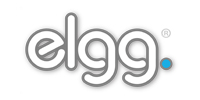Elgg (software)
 | |
| Developer(s) | The Elgg Foundation and the open source community |
|---|---|
| Initial release | July 25, 2006[1] |
| Stable release | 5.1.5 / March 22, 2024 |
| Written in | PHP |
| Operating system | Cross-platform |
| Type |
Content management system Social networking software |
| License(s) | GNU General Public License v2 |
| Website | elgg.org |
Elgg is free open-source social networking software that provides individuals and organizations with the components needed to create an online social environment. It offers blogging, microblogging, file sharing, networking, groups and a number of other features common to businesses, organizations, universities, and individuals utilizing social networking. Elgg runs on the LAMP (Linux, Apache, MySQL, and PHP) platform.
Product history
Elgg was founded in 2004 by Ben Werdmuller (von Elgg) and David Tosh. Werdmuller, a web entrepreneur who had been building and facilitating online communities since 1995, and Tosh, a postgraduate student in online education, combined their experience to apply a social networking approach to electronic learning[2], with the latter designing the architecture and writing most of the code. Subsequently, they founded the company Curverider Ltd. to continue the development of the software and to provide Elgg-related services, turning Elgg into a cross-purpose open-source social networking platform.
In April 2009, Werdmuller decided to leave the project[3]. In May 2010 a hosted version of Elgg launched in beta. By the end of the year, Curverider was acquired by Thematic Networks, and Elgg was transferred to a non-profit foundation[4][5]
In April 2010 former core developer Marcus Povey released a multiple-site version of Elgg called "Multisite Elgg."[6] As of February 2012, this project can be found on GitHub [7].
Features
Features of Elgg include[8]:
- flexible data model for entity creation
- plug-in API to build and extend functionality and features
- activity stream API for pushing plug-in content to users
- Web services API for plug-in and client development and publishing
- user and relationship management
- granular access permissions
Hardware/software requirements
Elgg runs best under the LAMP software bundle, as it requires an Apache Web server, a MySQL database, and the PHP interpreted scripting language.
Additional requirements for the Apache server exist. Please refer to the Elgg website.
Videos, screenshots, and other media
Screenshots for Elgg can be found on Softpedia.
Video tutorials of Elgg can be found on YouTube.
An online demo of Elgg can be found here. You'll have to register an account to use it.
Entities using Elgg
Examples of entities using Elgg include:
Aerospace, Australian government, British government, Canadian Employment and Immigration Union, Federal Canadian Government, Great Ormond Street Hospital, Harvard University Extension School, Johns Hopkins University, Live Out There, NASA, New Zealand Ministry of Education, Oregon State University, Oxfam, Royal College of British Architects, Saugus School District, Stanford University, The World Bank, Think Global School, Tides Canada, UNESCO, United Nations Development Programme, University of Brighton, University of Calgary, Grid Research Centre, University of Florida, Wiley Publishing
A full directory of Elgg users can be found at the Elgg website.
Further reading
- "Documentation on Elgg". Elgg Foundation. http://docs.elgg.org/wiki/Main_Page.
External links
- Elgg on GitHub
- Multisite Elgg on GitHub
- Elgg tutorials on phpqa
References
- ↑ "MindTouch Core Source". SourceForge. http://sourceforge.net/projects/dekiwiki/files/MindTouch%20Core%20Source/. Retrieved 23 March 2012.
- ↑ "Elgg - social network software for education". ReadWriteWeb. 11 August 2006. http://www.readwriteweb.com/archives/elgg.php. Retrieved 30 March 2012.
- ↑ Werdmuller, Ben (9 April 2009). "End of an era, start of a new one". Ben Werdmuller. http://benwerd.com/2009/04/end-of-an-era-start-of-a-new-one/. Retrieved 30 March 2012.
- ↑ Tosh, Dave (7 December 2010). "A foundation, acquisition and change". Elgg Foundation. http://blog.elgg.org/pg/blog/dave/read/160/a-foundation-acquisition-and-change. Retrieved 30 March 2012.
- ↑ Werdmuller, Ben. "The Elgg Foundation". 8 December 2010. http://benwerd.com/2010/12/the-elgg-foundation/. Retrieved 30 March 2012.
- ↑ Povey, Marcus (19 April 2010). "Multiple site support with MP's Multisite Elgg". Marcus Povey. http://www.marcus-povey.co.uk/2010/04/19/multiple-site-support-elgg/. Retrieved 30 March 2012.
- ↑ "mapkyca/Elgg-Multisite". GitHub. https://github.com/mapkyca/Elgg-Multisite. Retrieved 30 March 2012.
- ↑ "Elgg - Highlighted features". Elgg Foundation. http://elgg.org/features.php. Retrieved 30 March 2012.









